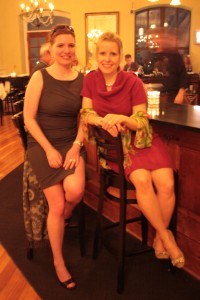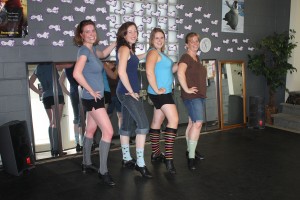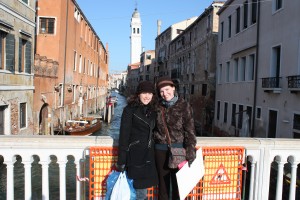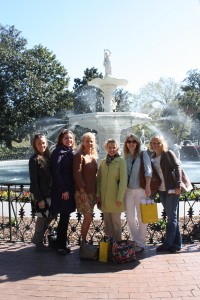Circle the Wagons: The Powerful Love of Women
Originally published March 10, 2012.
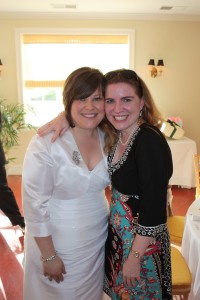
Sarah and me–friends since birth
Sarah and I have been best friends on and off again for nearly four decades. So closely did we grow up together, our mothers trading back and forth sleepovers and marching band pick-ups, that we are perhaps as close as sisters, closer perhaps. When life separated us for several years and we fell out of touch, it was that sisterly, almost clairvoyant love that drew us back together again.
I had suffered a devastating break-up. Sarah e-mailed me the day after the split. Only, we had not been in touch for around five years. To this day, we both believe she had somehow, across time and space, sensed my need of her. And our lives have been thus for years, one of us walking in just as the other is about to break.
This is no ordinary connection. That is not to say, however, that it is uncommon. Women, at least those among us brave enough to love fully, have an uncanny ability, so it would seem, for knowing just when to circle the wagons.
I have not always benefited from this love. Raised to be independent and distrusting of others, I was always reluctant as a girl and as a young woman to lead myself into vulnerability, particularly the vulnerability that comes of the deeply connected relationships that women often share.
It is no small surprise to me that men resist this kind of all-encompassing love. Some think it is smothering. And it can be. Women learn, over time, not to call on too many friends at once in times of crisis, or they will be overwhelmed with attention. How many nights have I found myself fielding phone calls and texts from half a dozen concerned females all at once after announcing to them some recent family tragedy? Even worse though is when, in recognition of this, I share a crisis with only one or two to be chastised later by the others for not letting them in to offer succor.
Circling the wagons is something of a professional calling for us, and it transcends the intimate relationships of tried and true friends, those who have followed us through high school and college, through marriage and divorce, childbirth and death of parents.
I belong to a community dance troupe made up of girls and women ranging in age from six to 60. Every week we engage in what we refer to as “group therapy”—a couple of hours of pulse-pounding dance accompanied by excessive tom-foolery. This is where we (the adult women anyway) let go, beyond the eyes of spouses who may know nothing of this side of us—the practical jokes, the tongue-in-cheek commentary on marriage, sex, and child raising, the posturing in front of dance studio mirrors, the banter over who has the curviest figure, the thickest thighs, the most perfect hair. We are so wild at times that new members to the group often aren’t quite sure what to make of us at first, but we convert them eventually to this gathering of “footloose” women. Here we are girls again, more than girls…because most of us were never confident enough, brave enough to be so ridiculous and fun when we were younger.
But this is also a space of deep camaraderie. When one among us lost a foster child back to her biological mother, we circled her with embraces, then turned her tears to laughter. When we prep for performances, mothers and daughters gather to braid each other’s hair, mend dance shoes with duct tape, and coax one another out of nervousness. Here we find the space to be members of a family where expectations are much lower, where we all recognize the staggering responsibilities of work, marriage, and motherhood, and give one another leave to be silly, irresponsible, and mindless…if only for an hour or two.
I do not know what I would do without these women…any of them…from my most intimate friends to the women with whom I dance each week. They fill my life with laughter, and they prop me up when I am too worn down to stand.
They have been there for me when my family has not been. And they have done all this unconditionally.
Sometimes I lie awake at night wondering why, what it is I have done to deserve the love and kindness of all these women, feeling the powerful blessing of knowing there is this invisible circle of support around me always.
When I feel I have erred foolishly in this life, I turn to my old college friend, Susannah, from whom I know I will always get a refreshingly honest and straightforward assessment of the situation…in addition to ice cream or cheesecake. Yet when I fail to take her sound advice and find myself in a fix, I never fear abandonment. “Friends are not the people who are there only when you do things right,” she tells me on a regular basis.
Yet I often wonder how many of us know this, how many of us are brave enough to test the true depth of our friendships, to be who we are without fear among the people we love. It is no easy thing. We are all guilty of holding back, playing games, pretending all is well…even among those closest to us, fearful of the depth and vulnerability we might discover should we let go…and fearful, too, of finding nothing, no depth, no connection, no unconditional love.
Humans are social creatures, and abandonment is one of our greatest primal fears.
It is one reason we are so lucky to be women. It is easy for us to look at men and their easy friendships with other men, their perception of “depth” as an intense conversation about politics, and their ability to compartmentalize pain and fear and envy them. And it is so easy for us to be angry with them, too, for failing to connect with us as our women friends do.
A friend of mine said to me recently, “I cannot help being angry with my husband because he does not know me as well as my best friend does.”
This is not so much a failing in the guy. It’s a failing in expectation. He does not know how, most likely, to know that woman as her best friend does. It is outside his comfort zone to go so deep, as it is with most men. They don’t live in a world of women the way we do. They cannot count on their male friends to protect their weaknesses, honor their strengths, and be there for them no matter the errors they make. It is not the way men are socialized, and it is why they need us so much more than we need them. For most men, it is their wives who serve as their only emotional centers, the only place where they can freely be themselves.
Imagine having only one person who offers you safety. Imagine having none.
I made a new friend recently, as I often do on travels, and as we walked back to our lodgings one evening, discovering, after only a couple of days’ acquaintance that we had much in common, including a similar painful life experience, she said to me with a laugh, “Can I marry you?”
I understood the message behind the joke. Because it took me a long time to stop looking to romantic partners to provide the kind of emotional depth and support that female friends do. I will not over-generalize and say that men cannot provide it. But it is rare to find such a man. As a rule, they retreat into their caves when hurting, confused, or troubled; whereas, women sound the alarm, ask for aid, and let the wagons circle. And when those wagons lock around us in times of trouble, there is no getting through until the danger has passed, chased away by the arrows of shared and recognized grief and the awareness that, with friends, just about anything is survivable.
